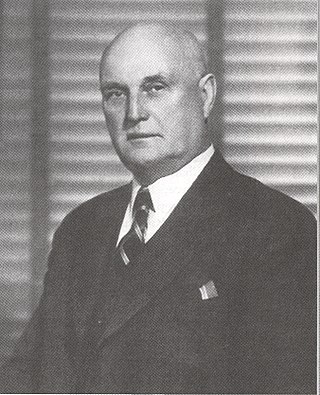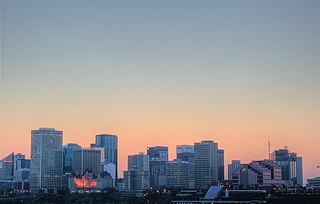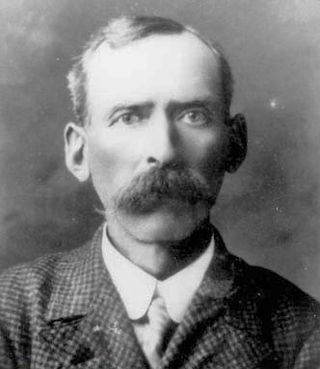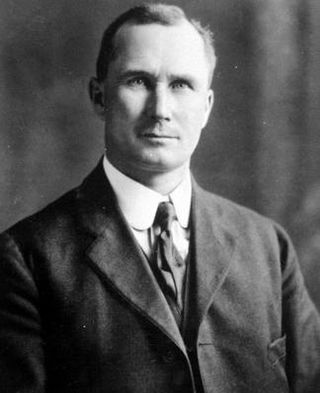
Charles Stewart, was a Canadian politician who served as the third premier of Alberta from 1917 until 1921. Born in Strabane, Ontario, in then Wentworth County, Stewart was a farmer who moved west to Alberta after his farm was destroyed by a storm. There he became active in politics and was elected to the Legislative Assembly of Alberta in the 1909 election. He served as Minister of Public Works and Minister of Municipal Affairs—the first person to hold the latter position in Alberta—in the government of Arthur Sifton. When Sifton left provincial politics in 1917 to join the federal cabinet, Stewart was named his replacement.

Events from the year 1921 in Canada.

The Edmonton Journal is a daily newspaper in Edmonton, Alberta, Canada. It is part of the Postmedia Network.

The Edmonton Ice were a junior ice hockey team based in Edmonton, Alberta, Canada, that played two seasons in the Western Hockey League from 1996 to 1998.

Downtown Edmonton is the central business district of Edmonton, Alberta. Located at the geographical centre of the city, the downtown area is bounded by 109 Street to the west, 105 Avenue to the north, 97 Street to the east, 97 Avenue and Rossdale Road to the south, and the North Saskatchewan River to the southeast.
Strathcona was a city in Alberta, Canada on the south side of the North Saskatchewan River. Originally founded in 1891, it amalgamated with the City of Edmonton in 1912.

Strathearn is a roughly triangular shaped residential neighbourhood in south central Edmonton, Alberta, Canada. Most of the development in Strathearn dates to the 1940s and 1950s.
Greenfield, also known as Petrolia, is a residential neighbourhood located in southwest Edmonton, Alberta, Canada. While the official name of the neighbourhood is Greenfield, some residents will refer to the area as Petrolia. There is a small shopping centre, Petrolia Shopping Centre, located in the neighbourhood. The neighbourhood was named for Herbert Greenfield, the Premier of Alberta from 1921 to 1925, during the reign of the United Farmers of Alberta political party.

Cornelius Gallagher was a meat merchant and politician in Alberta, Canada. He served as a municipal councillor and briefly as the third mayor of Edmonton.

Charles May was Canadian contractor and politician. He served on the Edmonton City Council and later as Mayor of Edmonton from 1905 to 1906.

James McCrie Douglas was a politician in Alberta, Canada, a mayor of Edmonton, and a member of Parliament serving in the House of Commons of Canada from 1909 to 1921.

Inglewood is a residential neighbourhood in north west Edmonton, Alberta, Canada.
The Arlington Apartments or The Arlington was the first apartment building to open in Edmonton, Alberta, Canada, in 1909. The 49 suite, five-storey redbrick building stood at 100 Avenue and 106 Street until 2005 when it was destroyed by fire. The building was a prime example of Edmonton's pre-Great War building boom that managed to survive into the 21st century.

The Princess Theatre is a two-screen art-house cinema located at 10337 Whyte Avenue in Edmonton's historic Old Strathcona neighbourhood. The building was designed by prominent Edmonton architects Wilson and Herrald, a firm responsible for the design of many other Edmonton heritage sites. It became Edmonton's oldest surviving theatre after the demolition of the Gem Theatre in 2006. The building currently houses the main 400-seat theatre as well as the 100-seat Princess II, located in the basement.

Freemasonry is a fraternal organisation that arose from the loose organization of medieval masons working in the medieval building industry.
The Canadian Western Jewish Times, established in 1914, was the first Jewish newspaper published in English in Western Canada and the earliest attempt to produce a Western Canadian regional Jewish newspaper in English. Like many other efforts to publish Jewish newspapers in Canada between 1891 and the first decades of the 20th century, it proved to be ephemeral.

Victor Albert Long (1866-1938) was a Canadian artist specializing in portraits of politicians and community leaders. His works hang in universities, in city halls, in provincial legislatures and in Canada's Parliament Buildings.

The Henderson's Directories are historical city directories of households and businesses in Canada, published starting around 1880. The geographical focus was on Manitoba, Alberta, and Saskatchewan; but coverage also included some cities in British Columbia and Ontario. Coverage varied depending on location and year. Titles also varied greatly: examples include Henderson's Manitoba and Northwest Territories gazetteer and directory, Henderson's Directories of Western Canada, Henderson's Edmonton city directory, and many others. The publication was intended to be annual, but publication frequency often varied.

Arthur Gregory Harrison (1870-1954) was an author, lawyer and civil engineer who served as City Commissioner of the City of Edmonton in Canada from 1911 until 1918. He subsequently became President of the Edmonton Exhibition Association.
David Hardie was a Canadian architect. Although Hardie was born in Glasgow and died in Vancouver, he is known for a number of buildings he designed in Edmonton, Alberta.

















